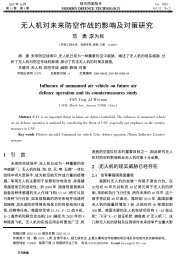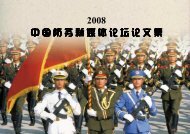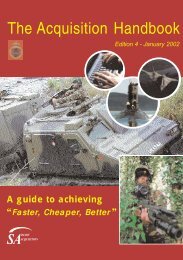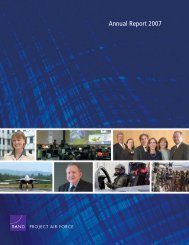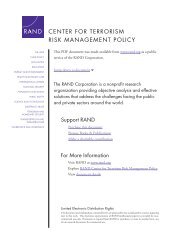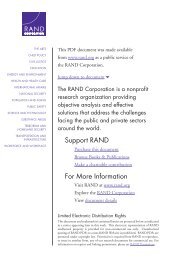How Terrorist Groups End - RAND Corporation
How Terrorist Groups End - RAND Corporation
How Terrorist Groups End - RAND Corporation
Create successful ePaper yourself
Turn your PDF publications into a flip-book with our unique Google optimized e-Paper software.
110 <strong>How</strong> <strong>Terrorist</strong> <strong>Groups</strong> <strong>End</strong>: Lessons for Countering al Qa’ida<br />
both countries. If they withdraw they will lose everything and if<br />
they stay, they will continue to bleed to death. 24<br />
Such images as the Abu Ghraib prisoners were sent around the globe<br />
via Internet, satellite television, and cell phone. The war in Iraq also created<br />
a perception that Islam was under threat. Many Muslims accepted<br />
al Qa’ida’s argument that jihad was justified precisely because Islam<br />
was under attack by the United States. Consequently, fighting ground<br />
wars in the Muslim world appeared to inflame, not quell, Islamic<br />
terrorism.<br />
The Return of al Qa’ida<br />
Indeed, the evidence since September 11, 2001, strongly suggests that<br />
the U.S. strategy was not successful in undermining al Qa’ida’s capabilities<br />
in the long run. Al Qa’ida remained a strong and competent<br />
organization. Its goals were the same: uniting Muslims to fight the<br />
United States and its allies (the far enemy) and overthrowing westfriendly<br />
regimes in the Middle East (the near enemy) to establish a<br />
pan-Islamic caliphate. 25<br />
Al Qa’ida was involved in more terrorist attacks in the first six<br />
years after September 11, 2001, than it had been during the previous<br />
six years. It averaged fewer than two attacks per year between 1995<br />
and 2001, but it averaged more than ten attacks per year between 2002<br />
and 2007. Figure 6.1 includes attacks in which al Qa’ida was directly<br />
involved between 1995 and 2007. The database is available in Appendix<br />
A. We excluded attacks in Iraq and Afghanistan. Since al Qa’ida<br />
attacks were part of a much broader insurgency, we found it difficult<br />
to disentangle which attacks al Qa’ida perpetrated and which other<br />
24 Michael Scheuer, Imperial Hubris: Why the West Is Losing the War on Terror, Washington,<br />
D.C.: Brassey’s, 2004, p. xxi.<br />
25 On the establishment of a caliphate, see, for example, Abu Bakr Naji, The Management<br />
of Savagery: The Most Critical Stage Through Which the Umma Will Pass, Cambridge, Mass.:<br />
John M. Olin Institute for Strategic Studies, Harvard University, 2006.




